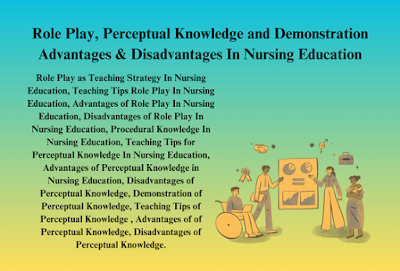The Role Play Perceptual Knowledge and Demonstration Advantages along with Disadvantages In Nursing Education. Role-playing and demonstrations are valuable pedagogical approaches in nursing education, each offering individual advantages and disadvantages.
The Role Play Perceptual Knowledge and Demonstration Advantages along with Disadvantages In Nursing Education
Role-playing, especially in nursing, promotes communication, empathy, and problem-solving skills by allowing students to act out scenarios and experience situations firsthand. Demonstrations, on the other hand, provide a clear visual representation of techniques and procedures, thereby promoting understanding and skill development. However, role-playing can be time-consuming, require careful planning, and cause discomfort for students. Demonstrations, on the other hand, may lack the complexity of practice and require intensive preparation by the instructor.
Perceptual Knowledge and Demonstration Role play is an immersive pedagogical method wherein participants adopt the personas of others. This technique may be structured with scripts, spontaneous, or semi-structured, allowing for observation and subsequent analysis of educational outcomes. It is adaptable for both classroom settings and virtual environments.
Teaching Tips for Role Play in Nursing Education
Educators must meticulously prepare for role play activities, ensuring readiness to observe and adapt student behaviors as needed. Scenarios involving emotional conflict are particularly effective for this approach.
Typically, the structure of a role play includes an introductory briefing, setting the context, and outlining objectives—often brief; followed by the main role-playing activity, which may span from 5 to 20 minutes; and culminating in a debriefing phase, where discussion, analysis, and evaluation take place, potentially extending from 30 to 40 minutes or more.
The debriefing segment is paramount, enabling students to dissect their actions, explore alternative choices, sharpen observational skills, and predict interpersonal reactions. Utilizing video or audio recordings can enhance this phase.
Role play is most effective with smaller groups, facilitating active observation by those not directly involved. Students should be encouraged to engage authentically, avoiding artificial performances. Critiques should focus on behaviors demonstrated rather than targeting individual participants.
Advantages of Role Play in Nursing Education
Role play augments observational acuity, refines decision-making capabilities, and deepens understanding of intricate human interactions. It provides immediate feedback on interpersonal and problem-solving skills within a low-risk environment, encouraging experimentation with new communication and decision-making strategies.
This method is particularly advantageous for adult learners due to its relevance to real-life scenarios and its emphasis on active participation. It incurs no additional costs as it generally requires no props or handouts.
Disadvantages of Role Play in Nursing Education
Students may exhibit reluctance if the scenarios do not closely mirror real-life situations, perceiving the activity as mere theatrical play. Developing role-play scenarios requires significant time investment from faculty. Educators who prefer controlling the learning environment might find this method challenging. Additionally, role play can reinforce stereotypical behaviors and, if poorly planned, may consume valuable class time.
Procedural Knowledge in Nursing Education
Procedural knowledge encompasses the methodology of performing tasks, inquiry techniques, and criteria for applying skills, algorithms, and methods. Instructional strategies related to procedural knowledge include algorithms, demonstrations, games, imagery and mindfulness, posters, self-learning modules, simulations, and writing.
Algorithms provide a systematic approach to clinical decision-making based on evidence, suitable for courses requiring repeated practice for mastery, rule-based problem-solving, or content that can be segmented into concrete stages. This method is effective both online and in classroom settings, facilitating peer or inter-professional learning in pairs or groups.
Teaching Tips for Perceptual Knowledge in Nursing Education
Evaluate the content for appropriate application of algorithms as a teaching strategy. Develop a detailed algorithm along with student explanations for its usage. Initial algorithm development may require 6 to 8 hours, with subsequent algorithms on similar topics generally requiring less time.
Advantages of Perceptual Knowledge in Nursing Education
An algorithm aids students in identifying critical information for problem-solving, fostering reliable and sophisticated problem-solving skills even among novices, and reducing the need for extensive one-on-one instruction. It is particularly useful for teaching complex, multi-step procedures and can enhance learning when used with case studies. Algorithms streamline the process of understanding and recalling complex concepts, benefiting students with limited clinical experience and supporting adherence to best practices.
Disadvantages of Perceptual Knowledge
Clear definition of algorithm steps is essential; otherwise, students may struggle with task completion. Instruction on algorithmic problem-solving may be necessary. Developing algorithms can be labor-intensive for faculty, and they cannot replace clinical reasoning in decision-making.
Demonstration of Perceptual Knowledge
Students exhibit their learning outcomes through projects, presentations, or other learning artifacts, demonstrating their achievement of learning objectives. Demonstrations serve as both a learning experience for students and a means of academic assessment by educators. This strategy is suitable for acquiring complex mental or psychomotor skills and is adaptable for both online and in-class assignments, particularly beneficial for inter-professional learning.
Teaching Tips for Perceptual Knowledge
Instruct students to clearly outline the steps of the process from beginning to end. Have them repeat the process, explaining their rationale and allowing time for questions. Provide immediate, individualized practice sessions under supervision. Video recordings can be used for review before and after the demonstration, and demonstrations can be planned, implemented, reviewed, and revised through online videos.
Advantages of Perceptual Knowledge
Visual demonstrations often enhance retention and comprehension of complex skills. Observing an expert model a skill provides clarity and helps in tailoring feedback, which improves retention and procedural knowledge for future problem-solving and metacognitive development.
Disadvantages of Perceptual Knowledge
Students exhibit varying degrees of skill acquisition. Those who master skills quickly may lose interest, while others may struggle during practice. Mastering psychomotor skills can be stressful and requires sufficient faculty supervision, space, and equipment for realistic practice sessions. The high workload for faculty in supervising practice sessions and the potential high cost of supplies and equipment may limit practice opportunities for students.
Read More:
https://nurseseducator.com/didactic-and-dialectic-teaching-rationale-for-team-based-learning/
https://nurseseducator.com/high-fidelity-simulation-use-in-nursing-education/
First NCLEX Exam Center In Pakistan From Lahore (Mall of Lahore) to the Global Nursing
Categories of Journals: W, X, Y and Z Category Journal In Nursing Education
AI in Healthcare Content Creation: A Double-Edged Sword and Scary
Social Links:
https://www.facebook.com/nurseseducator/
https://www.instagram.com/nurseseducator/
https://www.pinterest.com/NursesEducator/
https://www.linkedin.com/in/nurseseducator/
https://www.researchgate.net/profile/Afza-Lal-Din
https://scholar.google.com/citations?hl=en&user=F0XY9vQAAAAJ
